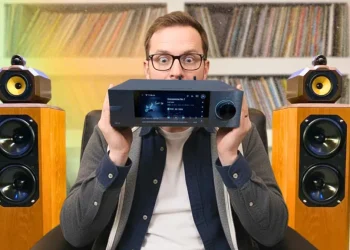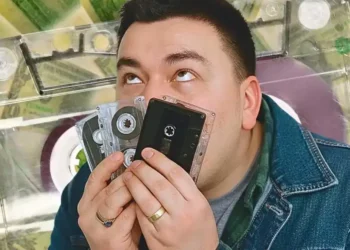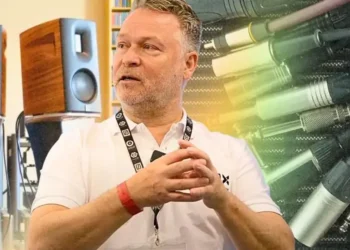This Audiophile Shrink Spent $20K on Gear—But Says Sound Quality Starts in Your Head
Dr. Arman has a killer audio setup—more than $20,000 worth of high-end headphones, amps, and streamers. But despite all the gear, he swears your ears aren’t the only thing doing the listening.
“Your mood, attention, even what you believe about what you’re hearing… that’s what really shapes the experience,” he says.
As a psychiatrist with over two decades of clinical experience and a lifelong music lover, Arman is challenging the way we think about sound. His message is simple, but a little radical for the audiophile crowd:
It’s not just about the specs. It’s about your brain.
A Glimpse Inside His $20,000 Setup
Dr. Arman isn’t anti-gear—far from it. His listening room features:
- Focal Utopia 2022 & Sennheiser HD800S headphones
- Feliks Audio Euforia EVO tube amp
- Burson Soloist 3X GT solid-state amp
- Eversolo DMP-A8 DAC/streamer
And yes, he hears real differences between them. On the Euforia tube amp, his Utopias deliver a “molten midrange” that he says “feels illegal.” On the Burson, the same track turns sharp and analytical—what he calls “pure clinical violence.”
But while he’s fascinated by those differences, he insists they don’t matter nearly as much as people think—especially once you’re in mid-to-high-end territory. The real magic, he says, is in your mind.
The Psychology of Sound: Why Your Brain Is the Final Filter
Arman argues that four main psychological factors dramatically influence how we perceive audio quality:
1. Mood
Your emotional state colors everything you hear. If you’re relaxed and joyful, music might sound vibrant and detailed. But catch yourself on a bad day? The same track could come across as dull or flat. As researchers have found, emotional states directly influence how we interpret music.
2. Attention
Listening while focused is totally different from listening while distracted. The brain picks up more detail, texture, and emotion when you’re locked in—versus just letting sound wash over you passively. Cognitive science backs this up: attention enhances auditory processing.
3. Belief
Ever bought a pricey cable and thought it sounded better? It probably did—to you. That’s the power of expectation. Arman compares it to the placebo effect: belief alone can make something feel more real, even if the change isn’t measurable.
One famous blind test had listeners compare a $220 Pioneer receiver to amps that cost over $10,000. Without knowing which was which, most people couldn’t consistently tell them apart.
“Even if there’s no objective difference, the subjective experience is real—and that’s what counts,” Arman says.
4. Personal Listening History
What you value in music often comes down to your past. A jazz musician might crave raw, live energy. A mastering engineer might chase pinpoint detail and balance. Neither is wrong—it just reflects different reference points.
Hearing Health, Pain, and the Role of the Body
Psychology isn’t the only factor. Your body affects how you hear, too.
- Ear health: Infections, wax buildup, or age-related hearing loss can dramatically alter your perception of detail—often without you realizing it.
- Pain and illness: Physical discomfort narrows your focus and dulls emotional engagement, making music feel less impactful.
- Brain chemistry: Medications or neurological shifts can change how the brain processes sound. Arman notes that some substances—even legal ones—can “sharpen” perception by altering focus.
Then there’s the volume trap. Louder often sounds better—clearer, more exciting—even if the quality hasn’t changed. But that illusion comes at a price: long-term hearing damage.
Why Expensive Gear Still Matters (Sort Of)
Arman isn’t calling expensive gear pointless. In fact, he loves his system. But he’s honest about the psychology behind it:
“Part of the joy comes from knowing it’s a $20,000 rig. And that’s okay.”
He even jokes about starting a fake headphone brand—just make them look cool, add some pseudoscience to the description, slap on a $10K price tag—and people will say they sound incredible. Because perception is powerful.
But that doesn’t mean people are gullible.
“Being suggestible doesn’t make you dumb. It means you’re open-minded or imaginative. Even super smart people can rationalize themselves into hearing something that isn’t technically there.”
So What’s the Takeaway?
Whether you’re a data-driven objectivist or a vibe-first listener, Arman says the most important thing is self-awareness. Understand how your brain affects what you hear—and give others space to enjoy it their way.
“Don’t be a dick to people who are more in the subjective camp or the objective camp,” he says.
“We’re all trying to make sense of this whole concept of audio quality.”
At the end of the day, audio isn’t just gear, graphs, or gold-plated cables. It’s a deeply human experience—shaped by your mood, your memories, and yes, your $20,000 setup if you’ve got one.
But even then?
It’s all in your head.
This article was rewritten by JournosNews.com based on verified reporting from trusted sources. The content has been independently reviewed, fact-checked, and edited for accuracy, neutrality, tone, and global readability in accordance with Google News and AdSense standards.
All opinions, quotes, or statements from contributors, experts, or sourced organizations do not necessarily reflect the views of JournosNews.com. JournosNews.com maintains full editorial independence from any external funders, sponsors, or organizations.
Stay informed with JournosNews.com — your trusted source for verified global reporting and in-depth analysis. Follow us on Google News, BlueSky, and X for real-time updates.













